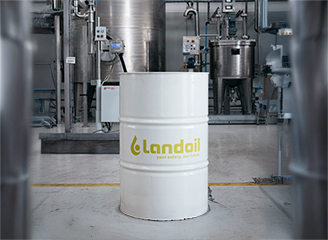In the machining sector, the choice of metalworking fluid plays a crucial role in optimising efficiency, the quality of the finished product and the environmental impact of the process. Ester-based emulsions are gaining popularity due to their superior performance and sustainability compared to traditional metalworking fluids.
In this article, we will explore the advantages of ester-based metalworking fluids, starting with safety aspects, then moving on to performance and finally analysing other key factors that make them a winning choice.
Safety and the Environment: A More Sustainable Alternative
Lower Toxicity and Better Air Quality
One of the most important aspects of ester-based emulsions is their low toxicity compared to traditional mineral oil-based metalworking fluids. Thanks to their lower volatility, they release fewer harmful fumes into the work environment. This contributes to improving the health conditions of the operators, reducing the risk of respiratory irritation, skin allergies and other problems related to prolonged exposure to dangerous chemical substances.
Compliance with Environmental Regulations
Ester-based emulsions are derived from renewable and natural sources, and are a more ecological alternative to petroleum-based metalworking fluids. This is fundamental for companies that want to comply with increasingly stringent environmental regulations and reduce their ecological impact. The use of these metalworking fluids can also contribute to obtaining environmental certifications and improving the company’s image on the market.
Longer Fluid Life and Reduction of Waste
The life of ester-based emulsions depends on their specific formulation, rather than on the nature of the base alone. Resistance to oxidation is mainly influenced by the degree of saturation of the carboxylic chains, while protection from microbial proliferation is determined by targeted formulation strategies. When properly balanced, these aspects allow for fluids with a longer lifespan, reducing the need for tank cleanouts, material waste and disposal costs. A longer-lasting fluid also contributes to a decrease in machine downtime and maintenance costs.
Superior Performance: Process Efficiency and Quality
Excellent Lubricating Properties
Ester molecules provide superior lubrication compared to mineral-based fluids, minimising friction between the tool and the workpiece. This protective effect helps limit wear on cutting tools, extending their useful life and reducing the need for frequent replacement. In addition, more effective lubrication improves the quality of the machined surfaces, reducing any defects and improving the precision of the final piece.
High Cooling Capacity
Temperature control is essential in machining processes to avoid overheating and ensure tight dimensional tolerances. Ester-based emulsions, thanks to their greater detergency compared to mineral oils, favour more efficient heat dissipation. This reduces the risk of damage to the machined piece and the tool, allowing optimal performance to be maintained even in high-speed machining.
Less Friction and Less Wear
The chemistry of esters offers a natural anti-wear effect, creating a protective film between moving surfaces. This drastically reduces the wear and tear on tools and machine tools, resulting in lower maintenance costs and greater reliability of the production process. In addition, a reduction in friction translates into lower energy consumption of the machine, contributing to a more sustainable and efficient process.
Better Surface Finish
The improved lubricating and cooling capabilities of ester-based emulsions reduce the formation of surface defects and thermal distortions in the machined part. This means less need for secondary machining operations, such as grinding or polishing, resulting in savings in production time and costs.
Other Advantages of Ester-Based Emulsions
Greater Cutting Efficiency and Increased Productivity
Thanks to their ability to reduce friction and control temperature, ester-based emulsions allow for an increase in cutting speed without compromising tool life or workpiece quality. This allows for faster production and an increase in the number of workpieces processed in the same time, improving the overall efficiency of the process.
Compatibility with a Wide Range of Materials
Ester-based emulsions are highly versatile and can be used on different materials, including ferrous and non-ferrous metals, special alloys and composite materials. This makes them an ideal choice for companies that work with different materials, guaranteeing constant performance regardless of the type of processing.
Stability and Reduced Foaming
The tendency of ester-based emulsions to foam depends on the overall formulation, and is not an intrinsic characteristic of all esters. However, thanks to their polarity, it is possible to modulate foaming behaviour, obtaining emulsions with controlled foaming based on specific application needs.
Excess foam can interfere with machining, especially in high-speed processes, compromising the cooling and lubrication capacity of the fluid. Landoil ester-based emulsions can guarantee greater stability even in extreme working conditions, ensuring a continuous and efficient process.
Conclusion
Ester-based emulsions represent an innovative and advantageous solution for mechanical processing. They offer a mix of safety, superior performance and environmental sustainability, making them an ideal option for companies that want to improve efficiency and reduce operating costs.
Thanks to their excellent lubricating and cooling properties, these fluids extend tool life, reduce wear and improve the quality of the finished piece. In addition, their ecological and low toxicity nature makes them safer for operators and compliant with ever-changing environmental regulations.
Adopting ester-based emulsions means investing in a more efficient, economical and sustainable production process. With the industry’s growing commitment to greener practices, these metalworking fluids are increasingly establishing themselves as the choice of the future.
FAQ
- What are the main advantages of ester-based emulsions compared to mineral oils?
They offer better lubrication, dissipate heat better, reduce tool wear and are more environmentally friendly. - Are ester-based emulsions suitable for all materials?
Yes, they are compatible with a wide range of materials, including ferrous, non-ferrous and composite metals. - How do they improve safety at work?
They are less toxic and less volatile, reducing exposure to noxious fumes and improving the quality of the air in the workplace. - Can they reduce maintenance costs?
Yes, thanks to the reduction in tool wear and the longer life of the fluid, savings can be made on maintenance and cleanouts.








